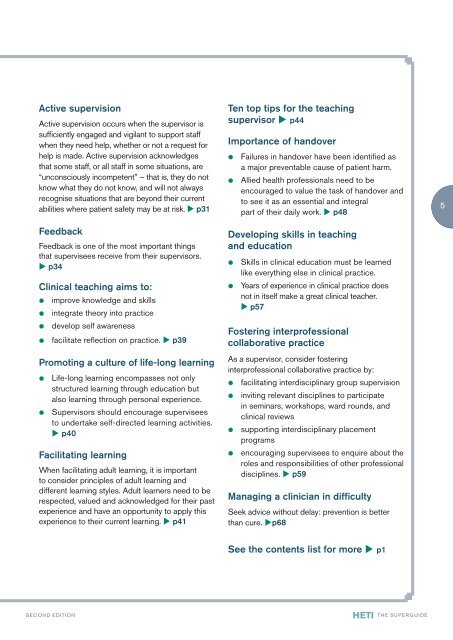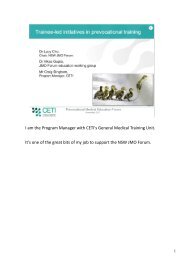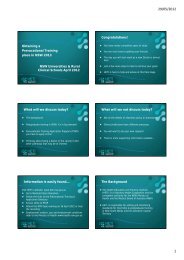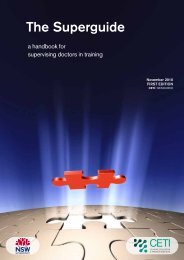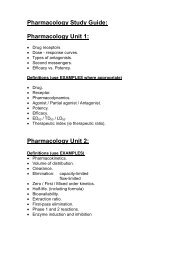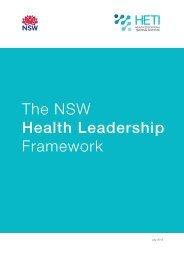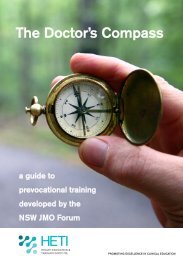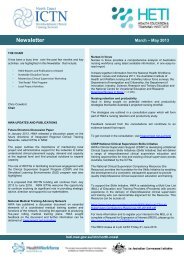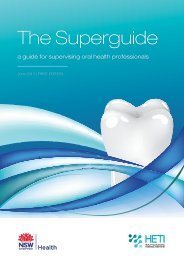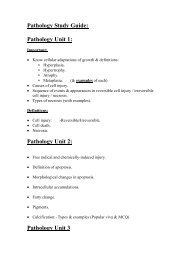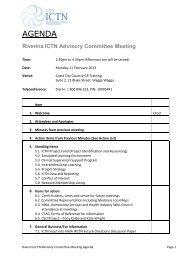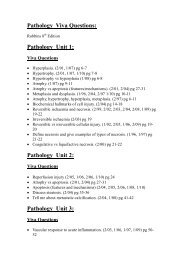a handbook for supervising allied health professionals - HETI - NSW ...
a handbook for supervising allied health professionals - HETI - NSW ...
a handbook for supervising allied health professionals - HETI - NSW ...
You also want an ePaper? Increase the reach of your titles
YUMPU automatically turns print PDFs into web optimized ePapers that Google loves.
Active supervision<br />
Active supervision occurs when the supervisor is<br />
sufficiently engaged and vigilant to support staff<br />
when they need help, whether or not a request <strong>for</strong><br />
help is made. Active supervision acknowledges<br />
that some staff, or all staff in some situations, are<br />
“unconsciously incompetent” – that is, they do not<br />
know what they do not know, and will not always<br />
recognise situations that are beyond their current<br />
abilities where patient safety may be at risk. u p31<br />
Feedback<br />
Feedback is one of the most important things<br />
that supervisees receive from their supervisors.<br />
u p34<br />
Clinical teaching aims to:<br />
• improve knowledge and skills<br />
• integrate theory into practice<br />
• develop self awareness<br />
• facilitate reflection on practice. u p39<br />
Promoting a culture of life-long learning<br />
• Life-long learning encompasses not only<br />
structured learning through education but<br />
also learning through personal experience.<br />
• Supervisors should encourage supervisees<br />
to undertake self-directed learning activities.<br />
u p40<br />
Facilitating learning<br />
When facilitating adult learning, it is important<br />
to consider principles of adult learning and<br />
different learning styles. Adult learners need to be<br />
respected, valued and acknowledged <strong>for</strong> their past<br />
experience and have an opportunity to apply this<br />
experience to their current learning. u p41<br />
Ten top tips <strong>for</strong> the teaching<br />
supervisor u p44<br />
Importance of handover<br />
• Failures in handover have been identified as<br />
a major preventable cause of patient harm.<br />
• Allied <strong>health</strong> <strong>professionals</strong> need to be<br />
encouraged to value the task of handover and<br />
to see it as an essential and integral<br />
part of their daily work. u p48<br />
Developing skills in teaching<br />
and education<br />
• Skills in clinical education must be learned<br />
like everything else in clinical practice.<br />
• Years of experience in clinical practice does<br />
not in itself make a great clinical teacher.<br />
u p57<br />
Fostering interprofessional<br />
collaborative practice<br />
As a supervisor, consider fostering<br />
interprofessional collaborative practice by:<br />
• facilitating interdisciplinary group supervision<br />
• inviting relevant disciplines to participate<br />
in seminars, workshops, ward rounds, and<br />
clinical reviews<br />
• supporting interdisciplinary placement<br />
programs<br />
• encouraging supervisees to enquire about the<br />
roles and responsibilities of other professional<br />
disciplines. u p59<br />
Managing a clinician in difficulty<br />
Seek advice without delay: prevention is better<br />
than cure. up68<br />
5<br />
See the contents list <strong>for</strong> more u p1<br />
SECOND EDITION<br />
<strong>HETI</strong><br />
THE SUPERGUIDE


